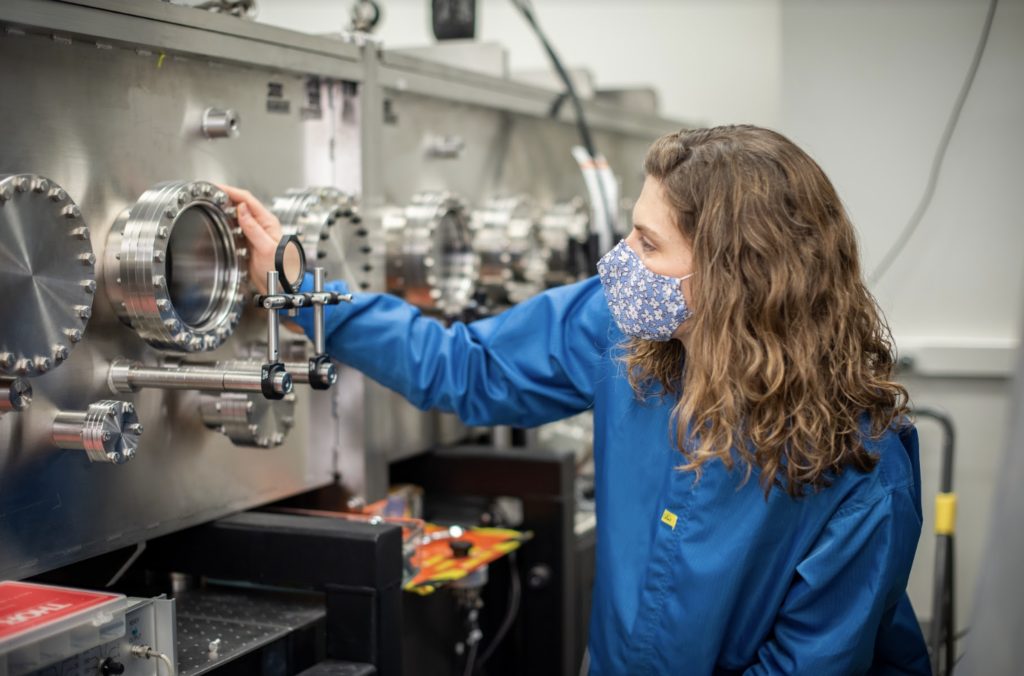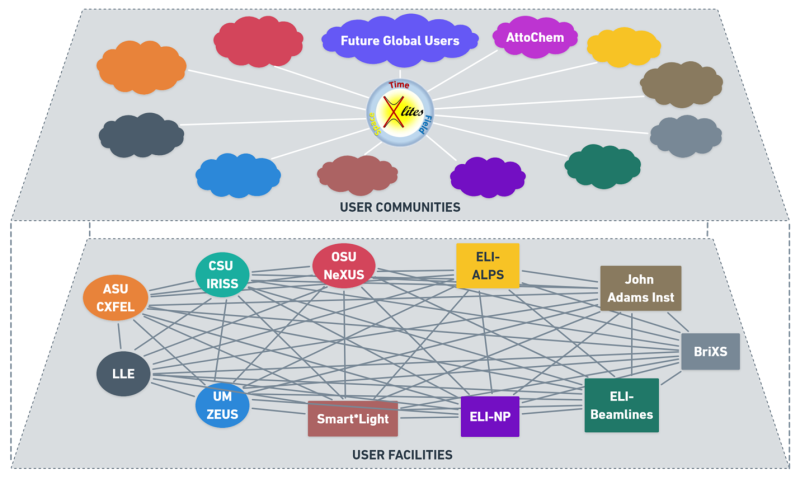ZEUS Joins International Community of Extreme Light Virtuosos

The University of Michigan’s three-petawatt ultrashort pulse laser facility known as ZEUS is now a member of a newly-funded multi-institution, international collaboration to develop and apply “extreme light” to advance the frontiers of science and engineering.
Extreme light refers to the new generation of lasers capable of accessing frontiers of laser-matter interactions at the highest intensities, the fastest times, and the shortest distances yet obtained.
Funded by the National Science Foundation and coordinated by The Ohio State University, the goal of this collaboration is to improve communication among otherwise separated research fields, and promote broad participation at the frontiers of laser-driven science. The initiative is called Extreme Light in Intensity, Time, and Space (X-lites).
“Each facility will have a different perspective, so the idea is to come together and figure out best practices and how to best integrate our different user communities,” explained Prof. Louise Willingale, Associate Director of the ZEUS Facility and Michigan PI on the project.
Guiding the X-lite team as they work out the best ways to foster collaborations between laser facilities on the one hand, and among the users themselves on the other, is the principle of The Science of Team Science, an interdisciplinary field that examines “how teams connect and collaborate to achieve scientific breakthroughs that would not be attainable by either individual or additive efforts.”
When completed in 2023, ZEUS, short for Zettawatt-Equivalent Ultrashort pulse laser System, will be the most advanced particle accelerator in the United States, and joins a network of similarly extraordinary facilities around the world with the goal of opening up research opportunities to an international cohort of scientists and engineers.
These laser facilities don’t come cheap. ZEUS, for example, is supported by more than $18M from the NSF. This means that researchers who are used to working in their own laboratories need to adapt to a new paradigm where they become part of a collaborative of researchers using the same facilities.

 Enlarge
Enlarge
Along with a greater number of facilities and users working together comes the need for highly-effective and efficient training. Managers of ZEUS have already hired several engineers, and will be hiring many more in the near future to train new users on the highly specialized equipment available in the ZEUS facility. Additional staff, including data scientists, electrical engineers, and mechanical engineers, will be hired to support the research.
“There are opportunities to efficiently train researchers who need to use specific types of experiments, so that not every facility would need to offer the same type of training,” said Willingale.
ZEUS leadership expects to be sending out requests for proposals (RFPs) this fall, giving researchers in a wide range of fields the ability to conduct research at Michigan at no cost to the user, aside from travel costs.
With users coming from a variety of disciplines (physics, chemistry, biology, materials, engineering, and more), there is tremendous opportunity for cross-disciplinary collaborations, which is considered essential for solving the most complex problems facing society.
“The entire ZEUS team is excited to be part of this international network of researchers and facilities,” said Willingale. “We’ve seen this work at Michigan, and we look forward to being part of the next frontier of extreme light.”
Additional Information
Current partners in the X-lites effort include:
- NSF NeXUS Facility, The Ohio State University
- Zettawatt-Equivalent Ultrashort Pulse Laser System (ZEUS), University of Michigan
- Compact X-ray Free Electron Laser (cXFEL), Arizona State University
- Laboratory for Laser Energetics (LLE), University of Rochester
- Extreme Light Infrastructure (ELI), Hungary
- Extreme Light Infrastructure-Nuclear Physics (ELI-NP), Romania
- Extreme Light Infrastructure (ELI)-Beamlines, Czech Republic
- BriXS, Italy
- Smart*Light, The Netherlands
- Attosecond Chemistry (ATTOCHEM), Spain
- John Adams Institute for Accelerator Science, United Kingdom
- Institute for Research in the Social Sciences (IRISS), Colorado State University. IRISS will provide expertise in forming collaborative teams.
X-lites is one of eight initiatives funded this year by the NSF Office of International Science and Engineering through their Accelerating Research through International Network-to-Network Collaborations (AccelNet) program, created to “to accelerate the process of scientific discovery and prepare the next generation of U.S. researchers for multiteam international collaborations.”

 MENU
MENU 
